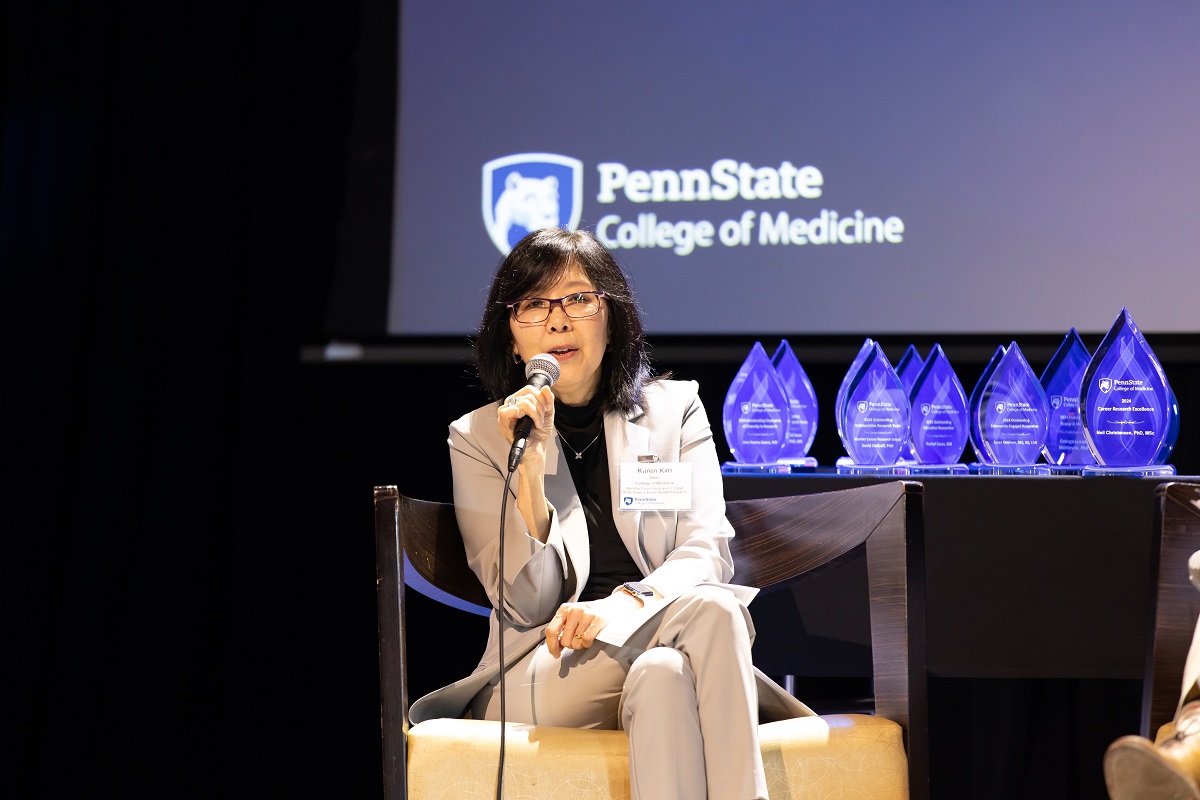 Dr. Karen Kim, dean of the College of Medicine, speaks at the Research and Innovation Awards on April 30. Kim recently updated the Penn State Board of Trustees Committee on Academic Affairs, Research and Student Life on the College of Medicine\’s strategies related to artificial intelligence.
Dr. Karen Kim, dean of the College of Medicine, speaks at the Research and Innovation Awards on April 30. Kim recently updated the Penn State Board of Trustees Committee on Academic Affairs, Research and Student Life on the College of Medicine\’s strategies related to artificial intelligence.
The Penn State Board of Trustees Committee on Academic Affairs, Research and Student Life discussed the University’s artificial intelligence portfolio and strategies to build upon the University’s current artificial intelligence (AI) footprint during its committee meeting on June 20.
July 2, 2024
Joining committee members were Dr. Karen Kim, dean of the College of Medicine, and Dajiang Liu, distinguished professor and vice chair for research in the Department of Public Health Sciences and director of bioinformatics and artificial intelligence. Together, they highlighted how the college is poised to be a leader in the AI revolution by fully leveraging science, technology and practice applications to enhance health.
“The College of Medicine, with our health system, Penn State Health, is uniquely situated to advance AI at the intersection of health and technology,” Kim said. “With our extensive data resources and outstanding faculty, we are reimaging biomedical research, education, health outcomes and value-based patient care.”
Kim outlined College of Medicine strategies to leverage AI into four tracks:
- Maximizing patient-related outcomes through predictive models for health and fair AI applications to improve the future of health
- Reimagining the role of AI in advancing scientific discovery
- Employing AI to address operational efficiencies and streamline work for faculty and staff
- Lessening administrative workloads by using AI to improve administrative efficiencies in a cost-effective way
“As Pennsylvania’s only rurally located academic health system and the commonwealth’s only land-grant university, we are using data to improve the lives of our community members,” Kim explained.
Investigating artificial intelligence to better health outcomes
AI continues to be a strategic priority at the College of Medicine. In 2023, the college issued pilot funding to support AI projects. Faculty have built upon that initial investment to further their research.
Across the College of Medicine, researchers are participating in projects related to using artificial intelligence with a variety of goals, including identifying risk factors to provide better preventative medicine, prevent recurrence of major health events or provide earlier and more accurate diagnoses for health conditions. A few examples include:
- Joining a national consortium of researchers to utilize artificial intelligence to improve the accuracy and timing of diagnosing autoimmune diseases. Diagnosing autoimmune diseases in early stages will allow for enhanced treatment.
- Developing a multi-center validated AI model to predict mortality and prevent recurrence of stroke.
- Being a funded site to use data science methods to study the mechanisms of female-specific chronic obstructive pulmonary disease as part of the National Institute of Health’s initiative to enhance women’s health research.
- Using AI algorithms to identify novel therapeutics for autoimmune disease and addiction behaviors.
In addition to utilizing the expertise of researchers and clinicians at the College of Medicine and Penn State Health for artificial intelligence projects, the college is working Penn State and Commonwealth Campuses and partnering with Highmark Health to leverage data science to maximize predictive models and patient related outcomes.
“The College of Medicine has been committed to making artificial intelligence a research priority long before it was a buzzword,” Liu said. “Our interdisciplinary faculty experts have the tools and drive to make our research competitive at the national level. I look forward to our progress and the future.”
